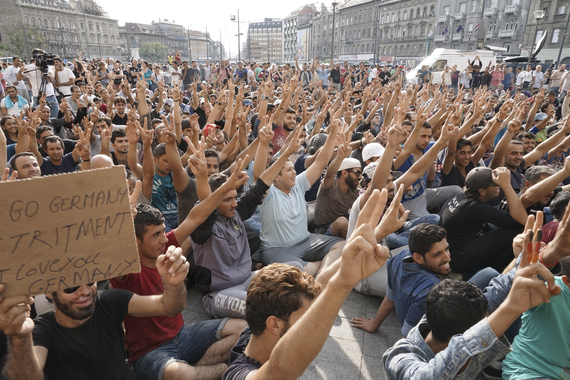By now, everyone has seen images of Syrian refugees streaming into and across Europe. And more than a few people have noted that every refugee seems to be carrying a smart phone. This may come as a surprise to westerners, who might think that refugees should be out of the tech loop, but in fact, as the World Bank reports, there are 85 smart phones (and I don't mean Nokias with Snake) for every 100 people in Syria. 110 per 100 for Egypt and 125 per 100 for the UK.
Smart phones are ubiquitous. It is possible to buy a second hand smart phone (iPhone 4) for less than $40.
Now, what makes this particularly interesting is that each of those smart phones has the capacity to shoot (and even edit) video, as well as broadcast (share) it with the rest of the world for free.
With three million Syrian refugees in the world that means that there are now approximately 2.5 million smart phones in Syrian hands, recording all the hardships and trauma that they are encountering every day. I mean, I think it is a pretty fair guess that if you have a phone with you and if you are undergoing what is probably the most traumatic experience of your life, then it is also a fair guess that you are recording it as video.
So where is all that video? 2.5 million cameras shooting 24 hours a day -- video that is unquestionably honest, first person, as it happens, on the spot, from the source storytelling. Of all those millions of hours of video, how much of it have you seen on TV news?
Would "none" be a good estimate?
Actually, my friend Ian Wagdin at The BBC led me to one link that made reference to some video that refugees trapped in a camp in Cyrpus shot. Here is how The BBC reported it:
The footage appears to have been filmed on a smartphone by one of the migrants at the camp, which has been set up at another military station in the east of the island.
One clip appears to show a man threatening to hang himself before British police officers arrive. In another, a young boy complains about the cold, saying he had only flip flops to wear on his feet.
A government spokesman said: 'We are aware of a series of incidents at the temporary accommodation facility in Cyprus.'
This is one video from one incident on one day. Where is all the rest?
The truth is that the networks, none of them, will show these videos, or even countenance showing them. And why? Probably because they feel you can't trust them as true.
What do they trust? They trust it when they send their own people to report on what is happening. Now, these reporters generally don't speak the language, know the culture, know the stories. They are the consummate outsiders, thrusting a microphone into someone's face for a quick soundbite. They report from a distance. And who knows if what they report is actually true. They are limited by what they know or don't know -- with an emphasis on the latter.
But actual footage from actual refugees who want to tell their own stories to the world? Apparently not.
Now, maybe there are more examples than the one above. Probably there are, but this is still pathetic. It's a remnant of a 19th century almost colonialist mentality. WE come to you to report the truth to the world. WE know better.
This was great in 100 years ago when, in the words of HL Mencken, The Freedom of the Press is limited to those who own a press. But today, with smart phones and the Internet, everyone - every Syrian refugee, every Palestinian, every Iraqi, and so on OWNS a press.
Where are their stories? Where are their voices?
There's an inherent irony here. Journalists love to extoll a FREE PRESS, until, that is, they are actually confronted with one.

